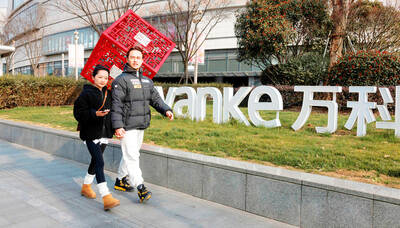To better serve its upscale neighbors in Taipei's Da'an district, the Far Eastern Group (
The new outlet will trade under the name "city'super."
"Based on our survey in the district, residents have expressed hopes to have a supermarket of a higher level and in a larger scale nearby," said Susan Chiou (
The community has several regular supermarkets like Wellcome, although these outlets can apparently no longer satisfy local needs.
Situated in a residential area known for its strong purchasing power, the mall is adjacent to the five-star Far Eastern Plaza Hotel, but has not operated a supermarket since its inception in 1994.
"Positioned as a mega-lifestyle-specialty store, the under-construction `city'super' supermarket will feature a higher portion of exclusive merchandise to lure consumers," said Andrew Chen (
The Far Eastern Group also owns the Far Eastern Department Store (
Introducing upscale supermarkets into shopping malls has become the latest trend, with examples ranging from the Breeze Center's (
These stores are characterized by their relatively high percentage of imported, higher-priced commodities, which sets them apart from their competitors and caters to their respective target clients.
The "city'super" will occupy a 1,100-ping (3,630m2) space in The Mall's basement. The store's consumer products, including cosmetics, stationery and house furnishings account for 40 percent of the product mix, while the other 60 percent will be food, fresh foodstuffs and snacks exclusive to the supermarket, Chen said.
"As normal supermarkets tend to be price-oriented by employing mass sales, the `city'super' places more emphasis on introducing special and high-quality products," Chen said. "Lowering prices is not the main strategy for us."
In its product mix of more than 10,000 items, 70 percent to 80 percent of daily merchandise is imported, while 50 percent of food is purchased from abroad, with an emphasis of freshness and consumer tastes.
The company projects to generate NT$789 million (US$25 million) in first-year sales and launch two more outlets in five years.

CHIP RACE: Three years of overbroad export controls drove foreign competitors to pursue their own AI chips, and ‘cost US taxpayers billions of dollars,’ Nvidia said China has figured out the US strategy for allowing it to buy Nvidia Corp’s H200s and is rejecting the artificial intelligence (AI) chip in favor of domestically developed semiconductors, White House AI adviser David Sacks said, citing news reports. US President Donald Trump on Monday said that he would allow shipments of Nvidia’s H200 chips to China, part of an administration effort backed by Sacks to challenge Chinese tech champions such as Huawei Technologies Co (華為) by bringing US competition to their home market. On Friday, Sacks signaled that he was uncertain about whether that approach would work. “They’re rejecting our chips,” Sacks

Taiwan’s long-term economic competitiveness will hinge not only on national champions like Taiwan Semiconductor Manufacturing Co. (TSMC, 台積電) but also on the widespread adoption of artificial intelligence (AI) and other emerging technologies, a US-based scholar has said. At a lecture in Taipei on Tuesday, Jeffrey Ding, assistant professor of political science at the George Washington University and author of "Technology and the Rise of Great Powers," argued that historical experience shows that general-purpose technologies (GPTs) — such as electricity, computers and now AI — shape long-term economic advantages through their diffusion across the broader economy. "What really matters is not who pioneers

BUBBLE? Only a handful of companies are seeing rapid revenue growth and higher valuations, and it is not enough to call the AI trend a transformation, an analyst said Artificial intelligence (AI) is entering a more challenging phase next year as companies move beyond experimentation and begin demanding clear financial returns from a technology that has delivered big gains to only a small group of early adopters, PricewaterhouseCoopers (PwC) Taiwan said yesterday. Most organizations have been able to justify AI investments through cost recovery or modest efficiency gains, but few have achieved meaningful revenue growth or long-term competitive advantage, the consultancy said in its 2026 AI Business Predictions report. This growing performance gap is forcing executives to reconsider how AI is deployed across their organizations, it said. “Many companies

China Vanke Co (萬科), China’s last major developer to have so far avoided default amid an unprecedented property crisis, has been left with little time to keep debt failure at bay after creditors spurned its proposal to push back a looming bond payment. Once China’s biggest homebuilder by sales, Vanke failed to obtain sufficient support for its plan to delay paying the 2 billion yuan (US$283.51 million) note due today, a filing to the National Association of Financial Market Institutional Investors showed late on Saturday. The proposal, along with two others on the ballot, would have allowed a one-year extension. All three